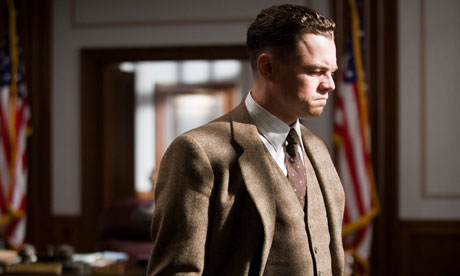
J Edgar (2011)
Director: Clint Eastwood
Entertainment grade: C+
History grade: C–
J Edgar Hoover founded the FBI in 1935, and remained its director until his death in 1972.
Politics
"Communism is not a political party; it is a disease," hisses the elderly J Edgar Hoover (Leonardo DiCaprio). It's in that context that the action flashes back to the red scare of 1919-20: a bomb explodes outside the Washington home of anti-radical crusader Mitchell Palmer. The film elides all American protest movements into communism and depicts Hoover as a visionary vigilante, standing almost alone against the reds. This is justifiable only on the grounds that the film is narrated by him. Hoover himself elided everything into communism, and believed himself to be a visionary vigilante. Ultimately, the film shows him to be an unreliable narrator – but most of the audience, especially outside the US, will probably not know enough about Hoover or early 20th century American politics to spot how much of it is true. Answer: not much. In reality, Hoover's targets during the red scare went beyond communists and anarchists to include prominent liberals, unprominent liberals, federal judges, senators, anyone who belonged to any union, the American Civil Liberties Union in particular, and black nationalists including Marcus Garvey. Ultimately, his investigation created files on more than 200,000 people and organisations.
Crime
Weirdly, J Edgar settles on the Lindbergh kidnapping of 1932 as the watershed event in Hoover's career. In real life, the Lindbergh case merits little more than a couple of pages in any Hoover biographies – some pointing out that the FBI tried to steal credit for solving it from the Treasury Department. Instead of the truth, the film gives us what it thinks would be Hoover's own unhistorical narrative, putting him right at the centre of the investigation and subsequent trial. Unfortunately, this means it spends a huge chunk of its runtime on Lindbergh and none on episodes of considerably greater significance, most obviously McCarthyism. The name of Joseph McCarthy is mentioned only once, in passing. Documents available since the 1970s show that the muscle behind McCarthy's witch-hunt was always Hoover and his FBI.
Opinions
"The nitwit Kennedy child rang his baby buzzer again," Hoover complains to his secretary. "Perhaps he needs a fresh diaper." He is blackmailing attorney general Robert F Kennedy with secret sex tapes of his brother, President John F Kennedy. The movie is correct in saying that Hoover compiled extensive files on the sex lives of the Kennedys, Martin Luther King and Eleanor Roosevelt, all of whom he detested. It is also correct in implying that he managed to stay at the head of the FBI for so long simply by having so much dirt on everyone that no one could risk firing him – though it could have made this point even more strongly.
Romance
Hoover's relationship with his deputy at the FBI, Clyde Tolson (Armie Hammer), has been gossiped about since the 1940s. The two were rumoured to be in a homosexual relationship, and were certainly in an exclusively homosocial one: they always dined together, holidayed together and were even buried together. Whether or not the relationship was sexual was much debated by their associates. The film's version is as fair as any historian could hope for. Hoover and Tolson are shown in a heated but unconsummated bromance, Hoover held back by his mother's dire warnings against becoming a "daffodil". The notorious rumour that Hoover was a closet transvestite comes from just one unreliable source, and the film – while nodding to it – sensibly doesn't ham this up. Indeed, the onscreen relationship between Hoover and Tolson is both historically feasible and unexpectedly moving. It is spoiled only by the overcooked old-man latex prosthetics DiCaprio and Hammer wear in the 1970s scenes, which obstruct any attempt by either actor to perform sincerely, and make poor Hammer look and move like The Thing from The Fantastic Four.
Verdict
Though screenwriter Dustin Lance Black has clearly done solid research, it's the choice to show so much of Hoover's life from his own skewed perspective that drags J Edgar's historical grade down.

